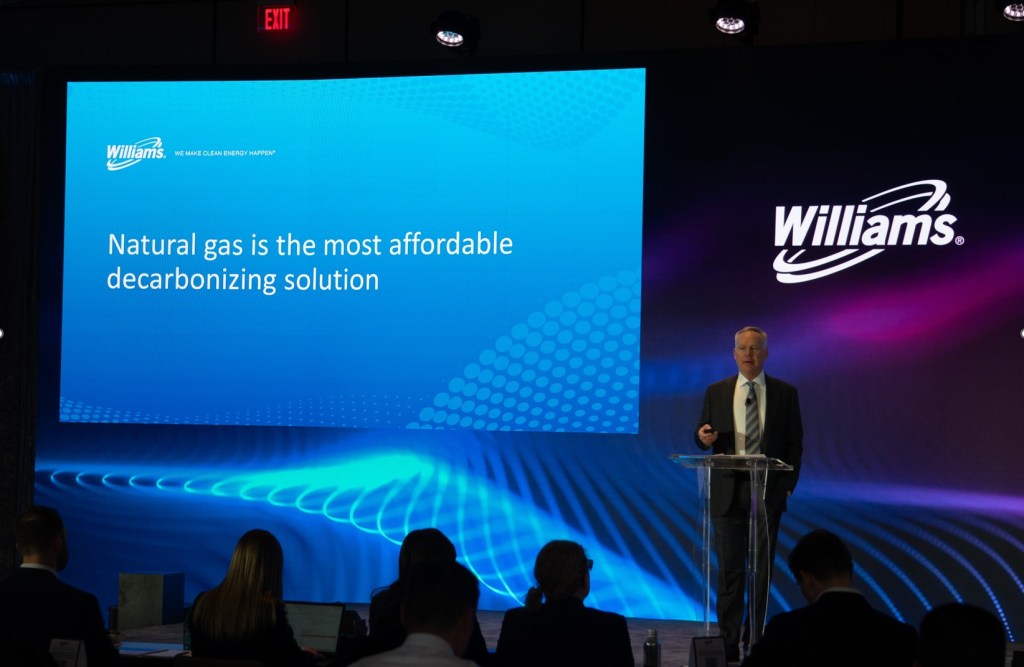Cutting-edge technologies help reduce emissions while meeting rising demand for clean natural gas.
Natural gas is playing an increasingly important role as the U.S. — and the world — moves toward a future powered by clean energy. With global demand expected to grow in the coming years, it is vital for the U.S. to invest in the innovations needed to meet this need while also lowering emissions.
For more than a century, Williams has powered America with clean natural gas. Today, it delivers one-third of the nation’s natural gas across 33,000 miles of energy infrastructure. Now it’s using its know-how to develop cutting-edge and scalable technologies to reduce emissions — from responsibly growing NextGen natural gas to displace high-emissions fuels, to the deployment of methane-monitoring satellites, real-time leak detection with AI, and efforts to develop high-efficiency clean hydrogen solutions.
Williams President and CEO Alan Armstrong says natural gas is the most powerful tool when it comes to reducing global emissions by displacing coal and fuel oil. And the company’s commitment to delivering reliability and affordability puts it at the forefront of the energy transition.
“Our infrastructure today is vital to meeting the energy needs of tomorrow,” Armstrong said at Williams’ Analyst Day in Washington D.C. “Natural gas is an immediate and scalable climate solution to reduce global emissions and serve the growing need for energy security, while creating long-term value for the nation — and the world.”

With many projects currently underway, Williams isn’t expecting a slowdown any time soon. In fact, the company is expanding its existing infrastructure with 18 high-return projects, as continued strong natural gas demand drives these expansions and paves the way for future growth, Hart Energy and Natural Gas Intelligence reported.
“Williams is excited to provide additional natural gas solutions to support the reliability of the U.S. power sector as it faces growing regional demand driven in large part by the emergence of new, large-scale data centers that are accelerating throughout our key markets,” Armstrong said.
Overall, analysts predict natural gas will continue to play a pivotal role in the energy transition in the coming years, with global demand forecast to rise well into the 2030s, according to a recent report by McKinsey & Company. Meeting the demand will require a long-term perspective and collaboration among stakeholders to map out the road ahead.
“We believe that partnering with like-minded energy experts and innovators is the fastest and most pragmatic path to a clean energy future,” Armstrong said. “Industry, government policymakers, innovators and investments must intersect to successfully advance our nation’s climate goals as demand for clean energy continues to rise.”
Of particular importance is Liquefied Natural Gas (LNG). The U.S. is the No. 1 exporter of LNG worldwide, with exports expected to double by the end of this decade. Last year, about half of these exports went to Europe, continuing a trend following the European Union’s decision to diversify its natural gas supply in the wake of the Russian invasion of Ukraine in 2022. Unfortunately, Armstrong said, the Biden Administration’s recent freeze on permits for new LNG projects is hindering the nation’s ability to lead the world in the clean, reliable energy needed to meet rising demand while also decarbonizing global consumption.
“LNG really is such a powerful tool that the U.S. really needs to unleash,” he said. “I think we see it as a very unfortunate political move that really does stand in the way of progress of the U.S. being a bigger and bigger player in helping reduce emissions around the world.”
Williams’ 116-year history of innovation provides it with the experience needed to help America — and the world — meet rising energy demands and usher in a future powered by clean energy.
“We have an incredible energy infrastructure and ecosystem here in the United States,” Chad Zamarin, Williams EVP for Corporate Strategic Development said at the company’s recent Clean Energy Expo. “It’s the envy of the world, and we source 3 trillion cubic feet of natural gas stored below ground and we can deliver it when and where it’s needed. That’s a national treasure. We have to protect that. We have to invest in it.”
